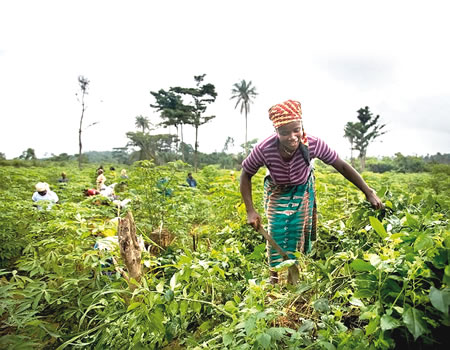Farmers across Nigeria are advocating for the reintroduction of mobile phones and e-wallet systems as essential tools for improving agricultural efficiency and food production. These technologies hold the promise of fundamentally transforming the agricultural sector by addressing longstanding issues related to food security. Farmers highlighted that mobile phones significantly enhance their access to critical information, while e-wallet systems facilitate the receipt of farm input subsidies from the government through local, certified agro-dealers. This instant access to information empowers farmers to make informed decisions and optimize their crop yields, particularly by providing real-time weather updates that are vital for planning irrigation and protecting crops from weather-related damages.
Historically, mobile phones and e-wallet systems were part of an agricultural transformation initiative led by the Federal Ministry of Agriculture and Rural Development during Goodluck Jonathan’s administration. The aim was to broaden farmers’ market access, enhance savings and loan opportunities, and assist them in adapting to the challenges posed by climate change. Dr. Akinwumi Adesina, who served as Minister of Agriculture, voiced the need to modernize agriculture by incorporating technology and attracting younger entrepreneurs to the sector. However, the full potential of these initiatives was hindered by allegations of corruption. Nevertheless, farmers believe that reintroducing these systems could significantly boost food production by offering access to subsidized inputs, particularly fertilizers.
Input from farmers reaffirms the integral role of mobile phones in agriculture, which facilitates connections with agricultural experts and provides educational resources for better farming practices. Coupled with e-wallets, these platforms streamline financial transactions and improve access to credit, addressing the barriers faced by many farmers in traditional banking systems. Martins Garba, a medium-scale farmer from Benue, emphasizes that e-wallets simplify financial operations, allowing farmers to make purchases and manage funds easily without needing physical bank branches. He asserts that improved financial inclusion is vital for investing in agricultural operations and scaling up production, thus leading to greater efficiency and reduced operational costs.
Further asserting the benefits of these technologies, Garba explains that digital payments can facilitate timely procurement of agricultural inputs, while mobile platforms can improve market access for farmers, ensuring fair pricing for their produce. The integration of mobile phones and e-wallet systems signifies a progressive strategy to tackle the challenges in agriculture, including the elimination of intermediaries, thereby allowing farmers direct access to necessary inputs. This technological shift positions farmers to enhance their productivity and contribute to a resilient food production ecosystem, while also enabling them to sell their goods more efficiently.
The National President of the All Farmers Association of Nigeria, Ibrahim Kabir, supports the idea of reinstating the older system of subsidized inputs, arguing that it provided significant advantages for farmers. He acknowledges the issue of rising inflation, which undermines the effectiveness of interventions aimed at making farm inputs more affordable. Kabir emphasizes the need for a comprehensive approach that ensures subsidies are equitable and accessible to all farmers, rather than favoring specific groups based on political affiliations. He insists that effective policies should address the diverse needs of all farmers, regardless of their location, and not create disparities in the system.
Kabir raises concerns about the exclusion of certain farmer demographics from intervention initiatives, questioning how livestock farmers and those outside targeted regions would fare without support. He advocates for equity and inclusivity in intervention strategies, as this will foster overall food sufficiency while uplifting the agricultural sector as a whole. Drawing from past experiences when fertilizers were available at affordable prices, he argues for a return to such systems, where farm inputs can be accessed without financial strain. Ultimately, he calls for sustainable solutions that ensure the effectiveness of subsidies while maintaining affordability for all farmers, enabling them to thrive and contribute to national food security effectively.














